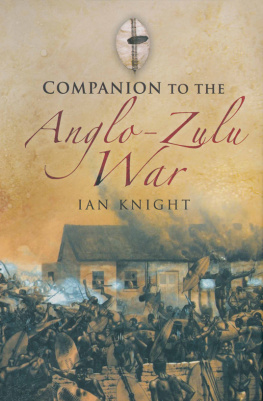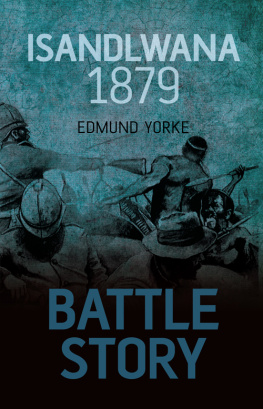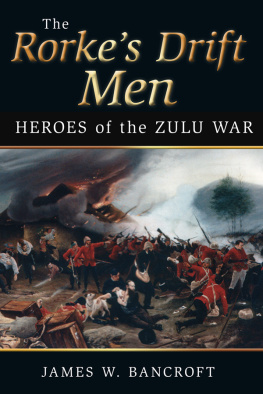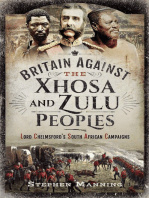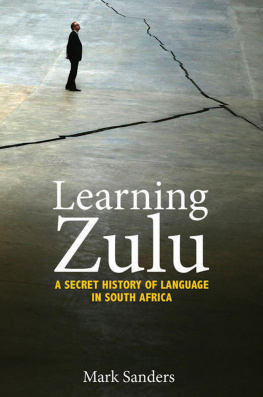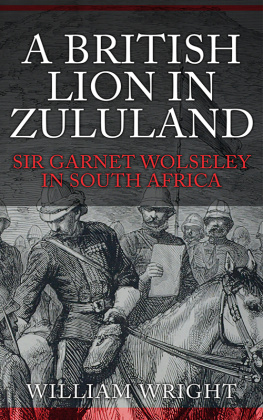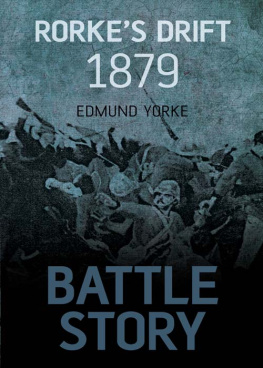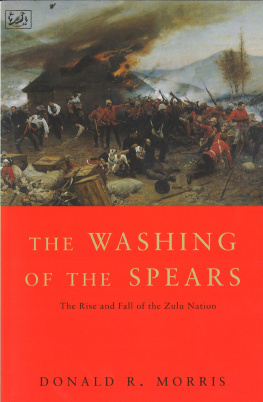A COMPANION TO
THE ANGLO-ZULU WAR
[The Zulus] were guilty of what in civilised countries are talked of as amongst the noblest virtues a nation can possess patriotism and loyalty. But if they knew no better than to hold such antiquated notions in earnest, they must reap the consequences. Under a free course of gin and missionaries they will soon become enlightened. Probably England never engaged in so unjust a war, or on such trivial grounds set her civilised force in motion to crush an independent savage power.
Francis Francis, War, Waves and Wandering (London, 1881).
Francis covered the war as correspondent for the London Times.
A COMPANION
TO THE
ANGLO-ZULU WAR
IAN KNIGHT
First published in Great Britain in 2008 by
Pen & Sword Military
an imprint of
Pen & Sword Books Ltd
47 Church Street
Barnsley
South Yorkshire
S70 2AS
Copyright Ian Knight 2008
ISBN 978-1-84415-801-0
The right of Ian Knight to be identified as Author of this Work has been asserted
by him in accordance with the Copyright, Designs and Patents Act 1988.
A CIP catalogue record for this book is
available from the British Library.
All rights reserved. No part of this book may be reproduced or transmitted in any
form or by any means, electronic or mechanical including photocopying, recording
or by any information storage and retrieval system, without permission from the
Publisher in writing.
Typeset in 9.5/11pt Times by
Concept, Huddersfield, West Yorkshire
Printed and bound in England by
Biddles Ltd
Pen & Sword Books Ltd incorporates the Imprints of Pen & Sword Aviation,
Pen & Sword Maritime, Pen & Sword Military, Wharncliffe Local History,
Pen & Sword Select, Pen & Sword Military Classics, Leo Cooper,
Remember When, Seaforth Publishing and Frontline Publishing.
For a complete list of Pen & Sword titles please contact
PEN & SWORD BOOKS LIMITED
47 Church Street, Barnsley, South Yorkshire, S70 2AS, England
E-mail: enquiries @pen-and-sword.co.uk
Website: www.pen-and-sword.co.uk
For Carolyn, Alex and Libby
CONTENTS
| Afrikaans |
| commando: | a group, usually of Afrikaner farmers, assembled for military purposes. |
| laager: | a defensive circle of wagons. |
| isiZulu |
| ibutho (pl. amabutho): | guild or regiment recruited according to the common age of the members. |
| induna (pl. izinduna): | state official or appointed functionary, officer, etc. |
| ikhanda (pl. amakhanda): | homestead maintained by the Zulu king containing a barracks for the royal amabutho. From head, meaning of royal authority. |
| umkhonto (pl. imikhonto): | a spear. |
| inkosi (pl. amakhosi): | hereditary ruler, chief, king. |
| inyanga (pl. izinyanga): | herbalist. |
| umnumzana (pl. abamnumzana): | head of the homestead, family patriarch. |
| impi (pl. izimpi): | a group gathered together for military purposes, an armed force; matters pertaining to war. |
| umuzi (pl. imizi): | homestead, collection of huts usually constituting a single family settlement. |
| isangoma (pl. izangoma): | spirit diviner; one who is able to commune with the ancestral spirits. |
| 1878 |
| 11 December: | British ultimatum delivered to King Cetshwayos representatives. |
| 1879 |
| 6 January: | British no. 4 Column (Wood) crosses the Ncome river into territory claimed by the Zulus. |
| 11 January: | The British ultimatum expires. No. 3 Column (Glyn) crosses into Zululand at Rorkes Drift. |
| 12 January: | No. 1 Column (Pearson) begins to cross into Zululand at the Lower Thukela Drift. No. 3 Column attacks inkosi Sihayos kwaSogekle homestead. |
| 17 January: | Main Zulu army leaves oNdini. |
| 18 January: | Elements leave main Zulu army to reinforce men defending the coastal districts; remainder continue towards no. 3 Column. No. 1 Column begins advance on Eshowe. |
| 20 January: | No. 4 Column establishes base at Fort Thinta. No. 3 Column arrives at iSandlwana. |
| 22 January: | No. 4 Column begins extended foray against abaQulusi positions on Zungwini and Hlobane hills. Battle of Nyezane. Pearsons column repulses an attack by an impi of 6,000 men commanded by inkosi Godide kaNdlela. Camp at iSandlwana attacked; 1,700 men of nos 2 and 3 Columns under Pulleine and Durnford defeated by main Zulu army (20,000 men) commanded by Ntshingwayo kaMahole. |
| 22/23 January: | Elements from the Zulu reserve at iSandlwana (3,000+ men) attack British supply depot at Rorkes Drift and are driven off by garrison commanded by Lts Chard and Bromhead. |
| 24 January: | No. 4 Column receives news of iSandlwana; breaks off engagement below Hlobane hill. |
| 27 January: | No. 1 Column receives news of iSandlwana. |
| 28 January: | No. 1 Column decides to hold position at Eshowe. |
| 31 January: | No. 4 Column moves camp to Khambula hill. |
| 11 February: | Lord Chelmsfords despatch detailing the disaster at iSandlwana reaches London. The Zulus cut communications between Pearsons force at Eshowe and the Thukela. |
| 3 March: | Improvised communication opened between Thukela and Eshowe. |
| 11 March: | First reinforcements authorised by UK Government arrive in Natal. |
| 12 March: | Stranded 80th convoy commanded by Captain Moriarty overrun at Ntombe by a force commanded by Prince Mbilini waMswati. |
| 28 March: | Attack by mounted elements of no. 4 Column on Hlobane mountain defeated by abaQulusi. |
| 29 March: | Main Zulu army under amakhosi Ntshingwayo and Mnyamana attacks no. 4 Columns camp at Khambula but is defeated. |
| 1 April: | Prince Imperial of France arrives in Natal to join Lord Chelmsfords staff. |
| 2 April: | Lord Chelmsfords column defeats Zulu coastal forces at kwaGingindlovu. |
| 3 April: | Eshowe relieved. |
| 5 April: | Prince Mbilini mortally wounded in a skirmish with a British patrol near Luneburg. |
| 6 April: | Serious false alarm at Mfunchini mission camp during the withdrawal from Eshowe. |
| 11 April: | The last British reinforcements arrive in Natal. |
| 13 April: | Lord Chelmsford reorganises British forces into 1st Division (H.H. Crealock), 2nd Division (Newdigate) and Flying Column (Wood). |
| 16 April: | Tpr Grandier found wandering near Hlobane mountain after his capture by the Zulus. |
| 20 May: | British forces on central Thukela raid Zulu homesteads opposite Middle Drift. |
| 21 May: | British expedition to iSandlwana battlefield to retrieve wagons and bury some of the dead. |
| 31 May: | 2nd Division crosses into Zululand; start of the second invasion by the British. |
Next page
